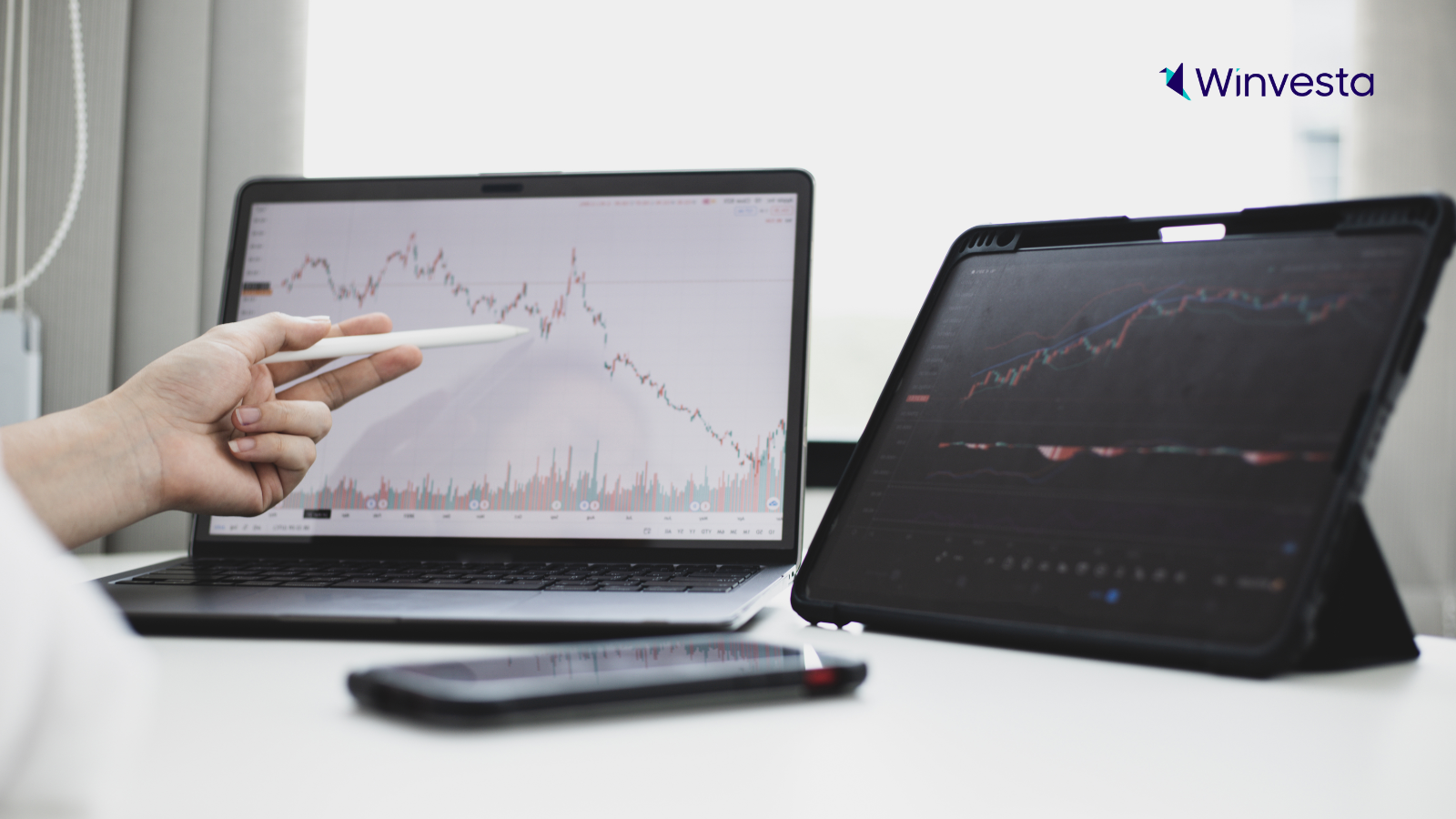Contents
What are ETFs, and why are they good for international investing?
7 minutes read
30 March 2025

Investing internationally is no longer the complex and intimidating task it once was. Thanks to Exchange-Traded Funds (ETFs), diversifying across global markets has become simple, cost-effective, and accessible to all types of investors. Whether you’re a beginner or an experienced investor, ETFs offer an opportunity to access markets worldwide with ease. In this blog, we’ll dive into what ETFs are, why they’re perfect for international investing, and the best ways to get started.
What are ETFs?
Exchange-Traded Funds (ETFs) are investment vehicles that combine various assets, such as stocks, bonds, or commodities, into a single fund. These funds are then traded on stock exchanges, much like individual stocks.
Think of an ETF as a basket that holds multiple investments, rather than buying each stock or bond separately. By investing in an ETF, you gain exposure to a broad range of assets within the fund. For example, an ETF focused on the technology sector may contain companies from different countries such as Apple (U.S.), Samsung (South Korea), and SAP (Germany). This allows investors to gain a diversified portfolio of technology companies without the hassle of picking individual stocks.
What makes ETFs unique is their flexibility. They allow you to invest in a variety of asset classes, including equities, bonds, real estate, and commodities. This makes them an incredibly versatile investment tool for those looking to build a balanced and diversified portfolio. Moreover, because they are traded on exchanges like stocks, they offer high liquidity and can be bought and sold throughout the day, unlike mutual funds which are only priced once a day.
Key features of ETFs
There are several key features that make ETFs attractive to investors:
-
Diversification: ETFs give you instant access to a variety of assets from different sectors or geographies, reducing the risk of investing in just one stock or bond. With a single ETF investment, you can achieve broad diversification across industries, asset classes, and even countries. For example, a broad-based international equity ETF might provide exposure to hundreds or thousands of companies from all corners of the globe. This not only spreads risk but also opens up opportunities in various high-growth markets that you might not have considered otherwise.
-
Cost efficiency: ETFs typically have lower expense ratios compared to mutual funds because they are generally passively managed. This means that the fund’s holdings are usually aligned with a specific market index, and there is less frequent trading involved, resulting in lower management costs. Over time, lower fees can translate into higher returns for investors, especially for long-term investors. This cost efficiency makes ETFs an attractive option for investors who want to keep expenses down while still accessing global markets.
-
Transparency: ETFs are usually transparent about the underlying assets they hold. Investors can view the exact components of the fund, which makes it easier to understand what they’re investing in and whether the ETF aligns with their goals. Unlike actively managed funds, which may have more hidden risks or lack of clarity, ETFs provide a clear and straightforward view of the investment.
-
Liquidity: ETFs trade on exchanges like stocks, meaning you can buy and sell them throughout the day during market hours. This is a significant advantage over mutual funds, which only allow trading at the end of the trading day. The ability to react quickly to market changes and adjust your portfolio accordingly is a crucial feature for many investors, particularly those who are concerned about short-term market fluctuations.
Why are ETFs ideal for international investing?
International investing can be tricky due to unfamiliar markets, currency fluctuations, and geopolitical risks. However, ETFs simplify the process by offering investors:
Access to global markets
ETFs allow investors to tap into both developed economies and emerging markets around the world. Whether you want to invest in the stable markets of Western Europe or the dynamic growth potential of emerging economies like China, India, or Brazil, international ETFs provide access to these markets with just one click. This opens up a world of investment opportunities that would otherwise be hard to access.
For example, let’s say you're interested in investing in the European market but you don’t want to spend time researching individual stocks from Germany, France, or Italy. By investing in a Europe-focused ETF, you gain access to the leading companies across the continent. Similarly, if you're interested in tapping into the growth potential of emerging markets, there are ETFs that focus on countries like India, Brazil, or even smaller markets like Nigeria and Vietnam. This allows you to take advantage of global growth trends without the complexities of managing multiple international investments.
Diversification across geographies
Investing in international ETFs also allows for diversification across different geographic regions, reducing the risk that comes with concentrating investments in one country or region. By investing in a global equity ETF, for example, you’re not just investing in one market—you’re gaining exposure to dozens, if not hundreds, of companies from different regions.
This type of diversification helps mitigate the impact of volatility in any one region. For instance, if the U.S. stock market faces a downturn, your global ETF may still perform well because it has exposure to other markets like Asia or Europe that might be doing better. This geographic diversification is one of the key reasons why international ETFs are so appealing to investors looking to balance their portfolios and reduce overall risk.
Ease of investment
Directly investing in foreign markets can be complicated due to a variety of factors: regulatory hurdles, different trading hours, currency conversions, and complex tax implications. International ETFs eliminate these obstacles by allowing investors to access foreign markets as easily as they would domestic investments.
With international ETFs, you don't need to worry about navigating a foreign country’s stock exchange or converting your money into local currencies. Everything is handled for you, and you can invest with the same convenience and simplicity as if you were trading domestic stocks. This ease of investment makes international ETFs an ideal choice for those who want to explore global markets without the extra hassle.
Types of international ETFs
There are a wide variety of international ETFs, each designed to meet different investment goals:
-
Broad international ETFs: These focus exclusively on non-U.S. markets, offering a broad mix of global companies. These are perfect for investors who want exposure to a wide range of international markets without being specific about any one country or region.
-
Regional ETFs: These target specific geographic regions such as Europe, Asia-Pacific, or Latin America. If you're particularly interested in a specific region’s growth potential, a regional ETF allows you to focus on a specific area of the world while still achieving diversification within that region.
-
Country-specific ETFs: These allow you to invest in individual countries, such as Japan, India, or China. Country-specific ETFs are ideal for those who believe in the growth potential of a particular market and want to invest in it directly.
-
Emerging market ETFs: These focus on high-growth economies that may offer higher risk but also higher potential rewards. Markets in countries like Brazil, India, and South Africa are considered emerging, and these ETFs allow you to tap into those markets with one investment.
Advantages of international investing through ETFs
Here are some of the key benefits of using ETFs for international investing:
-
Lower costs: ETFs are typically more cost-effective than actively managed mutual funds, thanks to their passive management strategy. By keeping fees low, you can maximize returns over time, especially if you’re investing for the long haul.
-
Flexibility: ETFs are highly liquid and can be traded throughout the day like stocks. This gives you flexibility in managing your portfolio, enabling you to react quickly to market changes, political developments, or economic shifts.
-
Tax efficiency: Many ETFs are designed to minimize capital gains taxes, which can be a significant benefit for investors looking to optimize their tax strategies. This is especially important for international investors who may face additional tax complexities when investing in foreign markets.
Risks and considerations
While international ETFs provide many advantages, there are still some risks to be aware of:
-
Currency fluctuations: When you invest in foreign markets, changes in exchange rates can impact your returns. For example, if the U.S. dollar strengthens against the euro, the value of your European investments may decrease even if the European stock market is performing well.
-
Political and economic risks: Investing in foreign markets means you’re exposed to the political and economic stability of those countries. Political instability, economic recessions, or government changes can all negatively affect the value of your investment.
-
Research requirements: It’s important to do thorough research on the ETF you’re considering. Understanding the underlying index, the assets it holds, and the region it focuses on is crucial to making an informed investment decision.
How to start investing in international ETFs
If you’re ready to get started with international investing through ETFs, follow these simple steps:
-
Open a brokerage account: To buy ETFs, you’ll need a brokerage or demat account.
-
Do your research: Look for international ETFs that align with your investment goals—whether that’s growth, income, or exposure to a specific market.
-
Diversify your investments: Don’t put all your eggs in one basket. Consider diversifying across regions or sectors to balance risk and reward.
For beginners, starting with broad international or regional ETFs is a great way to get exposure to global markets without too much complexity.

Ready to own a piece of the world’s biggest brands?
- Invest in 4,000+ US stocks & ETFs
- Fractional investing
- Zero account opening fees
- Secure and seamless
Start investing in just 2 minutes!

Build your global portfolio.
.png)
Invest in companies you love, like Apple and Tesla.

Track, manage, and grow your investments.
International investing doesn’t have to be intimidating. With ETFs, you can easily tap into global markets, diversify your investments, and keep your costs low. Whether you’re interested in high-growth emerging markets or the stability of developed countries, ETFs offer an easy and cost-effective way to access international opportunities.
ETFs are an excellent tool to get started if you’re looking to explore global markets and expand your portfolio. With their simplicity, cost-efficiency, and flexibility, international ETFs can help you make the most of your investment strategy.
Frequently asked questions about ETFs
International ETFs help diversify your portfolio by giving you access to both developed and emerging markets worldwide. This reduces risk, mitigates volatility, and simplifies global investing in one easy step.
An ETF (Exchange-Traded Fund) is a fund that holds a collection of assets and trades on stock exchanges like individual stocks. It’s important because it offers diversification, low costs, transparency, and easy liquidity, making it perfect for both beginners and seasoned investors.
Global ETFs: Include investments from all over the world, including your home country.
International ETFs: Only focus on foreign markets, excluding your home country.

Contributed by Denila Lobo
Denila is a content writer at Winvesta. She crafts clear, concise content on international payments, helping freelancers and businesses easily navigate global financial solutions.



